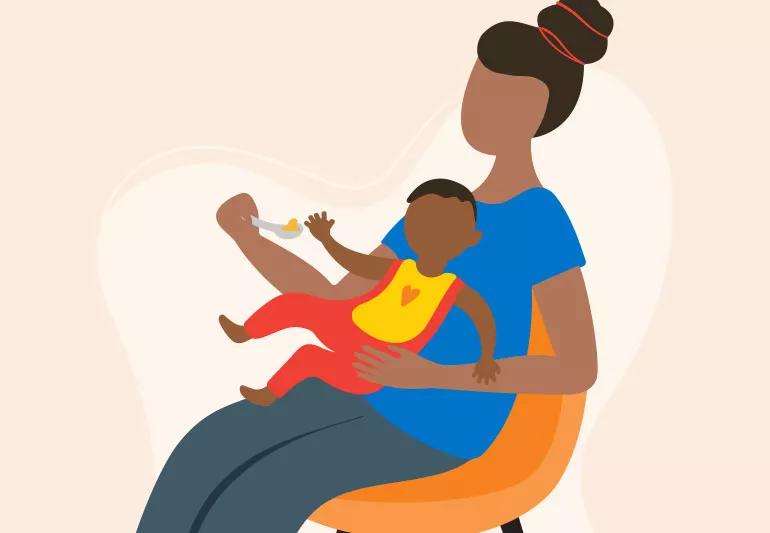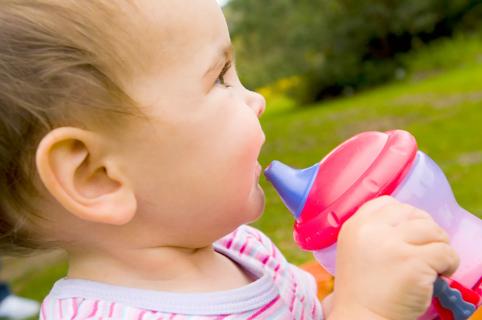Early exposure to peanuts may prevent the development of an allergy

There’s a simple way to reduce the risk of your child developing a peanut allergy: Let them eat the food at an early age.
Advertisement
Cleveland Clinic is a non-profit academic medical center. Advertising on our site helps support our mission. We do not endorse non-Cleveland Clinic products or services. Policy
Introducing infants to peanut-containing food can help prevent a peanut allergy from emerging and taking hold, according to current guidelines. That first taste of peanuts can be offered when your child is as young as 4 months old.
The recommendation from the National Institute of Allergy and Infectious Diseases (NIAID) dates to 2017. It represents a vastly different approach from previous advice that grew from an increase in allergy cases.
So, why the change? And how can this early peanut introduction be done safely, especially with at-risk children? Let’s find out from allergists Sandra Hong, MD, and Jaclyn Bjelac, MD.
It’s no secret that peanut allergies have become more common. In 1997, an estimated 1 out of 250 children — or 0.4% of kiddos — had a peanut allergy. Two decades later, researchers put the number at 1 in 40 children, or 2.5% of kids.
As peanut allergy cases skyrocketed, doctors recommended that peanuts be removed from the diets of young children until they were preschool-aged.
Then came the Learning Early About Peanut (LEAP) study in 2015. The research showed that feeding peanut-containing food to children during infancy and early childhood decreased the frequency of peanut allergies by a whopping 81%.
Advertisement
“What we’ve seen is that the vast majority of infants do beautifully when introduced to peanuts early,” says Dr. Bjelac. “They never develop a peanut allergy, even if they’re at a high risk for it.”
An introduction to peanut products can take place soon after your baby starts eating solid foods, which typically happens between 4 and 6 months of age. Wait until they’ve successfully eaten a few different foods — such as cereals, fruits and vegetables — before working in peanuts.
Peanut butter, peanut flour or peanut powder works best for little ones, too. Think small portions, with bits of the peanut product diluted in warm water, formula or breast milk and mixed into food. (Avoid giving infants actual peanuts, which can be a choking hazard.)
If the taste test goes well without any signs of an allergic reaction, continue to regularly add peanut products to meals until your child is 5 years old. “Make it a regular part of your baby’s diet,” advises Dr. Hong.
But if you see your child develop mild allergic symptoms (like a skin rash or minor itching) after eating a peanut product, pull back on the introduction and talk to your pediatrician for guidance on how to best move forward.
Don’t hesitate to seek urgent medical attention if you see significant allergic symptoms (like vomiting or difficulty breathing) in your child after they eat a peanut product.
“It’s never wrong to seek emergency care if your parental senses start tingling,” reassures Dr. Bjelac. “But thankfully, infant allergic reactions are very rarely severe.
There isn’t any reason to delay the introduction of peanuts even if your child is believed to be at high risk for developing a food allergy, says Dr. Bjelac. That’s the newly evolved approach favored internationally and by many specialists, given research findings.
But some organizations, including the NIAID, still recommend potential testing for high-risk infants. Dr. Bjelac says there’s been a movement to revise those “outdated” guidelines.
Talk with your child’s pediatrician or allergist if you have any questions or concerns.
Now the big question: Has this change in approach regarding the introduction of peanuts helped reduce peanut allergies over the past few years?
Early signs are positive. A study published in 2020 showed a 16% decrease in peanut allergy prevalence following the move toward an earlier introduction of peanuts. Overall numbers remain high, though.
Typically, 1 in 5 children with a peanut allergy outgrows it as they age. There’s hope that an early introduction of peanuts and other interventions — including early food desensitization treatment — can increase that to 4 out of 5 children.
Advertisement
“The trend is moving in the right direction,” states Dr. Bjelac.
Advertisement

Sign up for our Health Essentials emails for expert guidance on nutrition, fitness, sleep, skin care and more.
Learn more about our editorial process.
Advertisement

In babies under 12 months old, cow’s milk has been associated with gastrointestinal bleeding

No juice until your child is 1 year old — and even then, they shouldn’t have much, if any

Ultimately, the choice depends on what works best for you and your baby, but it’s also important to be aware of the pros and cons of both

Ideally, you want your toddler to be drinking from a ‘big kid cup’ by age 2

Letting your baby feed themself foods the whole family enjoys has its benefits — but stick to softer foods and follow safe-eating guidelines

Levels are generally low, but there are ways to minimize potential health risks

Slowly introducing cow’s milk (or soy milk) can help your child make the change

In babies under 12 months, honey may cause a serious illness called infant botulism

Even small moments of time outdoors can help reduce stress, boost mood and restore a sense of calm

A correct prescription helps your eyes see clearly — but as natural changes occur, you may need stronger or different eyeglasses

Both are medical emergencies, but they are very distinct events with different causes